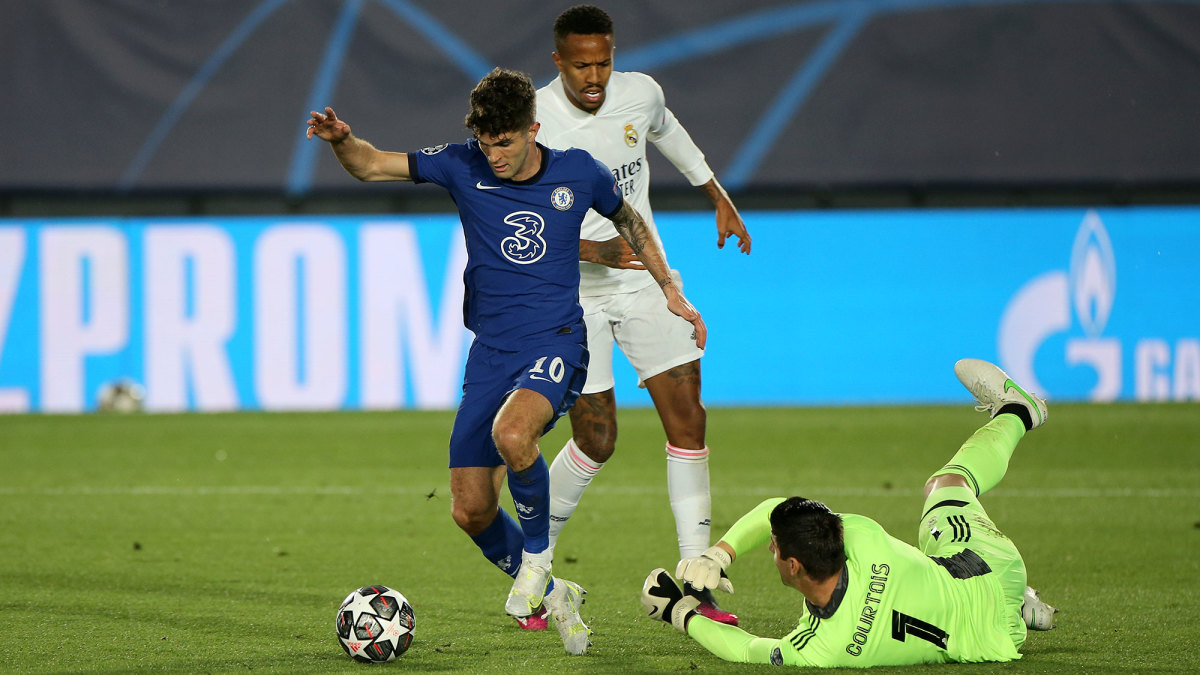Chelsea May Give Real Madrid a Champions League Exit—Just Not the Kind Its President Desires
For Chelsea, the only disappointment will be that it did not finish the job. The Blues dominated Tuesday's Champions League semifinal first leg at Real Madrid for long periods and took an early lead, and while a 1-1 draw leaves the tie in the balance, the sense from the flow of the game is that Chelsea is the better of the two sides. Structure, system and organization largely thwarted the individual excellence preferred by Real Madrid president Florentino Pérez.
That added to what, if Pérez were capable of being chastened, would have been a chastening week. While his client media in Spain have remained supportive, he has been derided as a laughingstock elsewhere. Pérez still refuses to acknowledge that his Super League dream is over, and he has hit out at a range of supposed enemies.
In two rambling, barely coherent interviews, he attacked English football in general, insisting opposition to the Super League was a result of a desire to protect the Premier League and making some grossly inaccurate claims about which teams were making profits. He also spoke of one club in particular he felt had tried to undermine the project from the start. That was probably Manchester City, but it may have been Chelsea—they were the first two clubs to start the momentum of withdrawing from the proposed league. Pérez further claimed, despite reams of evidence to the contrary, that the protests against the Super League outside Stamford Bridge last Tuesday were a fabrication and that only 40 fans had turned up, when in fact there were several hundred.
His arguments that the Super League would create a trickle-down effect were laughably misguided, both in terms of his understanding of economics and how fans think. Yet he is such a powerful figure in Spain, financially, politically and in football, that sections of the Spanish media chose to attack the New York Times, baselessly accusing one of its writers of being on the take on behalf of Pérez’s great rival, La Liga president Javier Tebas.
Plenty of oxygen was also given to the possibility of a referee favoring Chelsea because it had returned to the UEFA fold far quicker, which was a low and frankly embarrassing stunt. As an example of the way a craven media can support a populist leader, it couldn’t have been bettered. The rest of the world saw the emperor was naked; swathes of the Spanish press insisted outsiders were simply jealous of his fine new suit.
Yet the revolution Roman Abramovich enacted in European football when he bought Chelsea in 2003 cannot be denied. His wealth and that of the sovereign wealth funds of Qatar at Paris Saint-Germain, who turned down an invitation to join the Super League, and Abu Dhabi at City, has radically changed the landscape, threatening the hegemony of the traditional elites.
That underlying issue was the principle driver toward the launch of the Super League, accelerated by the losses of the pandemic, as Pérez sought to secure guaranteed riches. Yet such is the sense of unreality in which the 74-year-old now exists he was still talking this week about wanting to sign both Erling Haaland and Kylian Mbappé, insisting without a Super League that would not be possible. Not surprisingly, the rest of the world seemed less bothered by the dawning of economic reality at the Bernabeu.
Even the most one-eyed Madridista, though, would have had to acknowledge that Chelsea began the better of the two sides on Tuesday. U.S. men's national team star Christian Pulisic, showing admirable composure, put Chelsea ahead after 14 minutes. Had Timo Werner been in better form, Chelsea could have been out of sight within half an hour. Madrid was staggeringly open, the switch to a back three serving only to create huge spaces between the defense and the midfield.
But Pérez has always trusted individual ability over systems, and the effectiveness of that as a policy was seen as Karim Benzema, having already struck the post, hooked in a spectacular volley as a corner was headed back across goal after 29 minutes–his 71st career Champions League goal (bringing him level with Real Madrid legend Raúl for fourth-most in history). That tempered Chelsea’s confidence to an extent, but Madrid still looked far from comfortable.
A triple substitution by Chelsea midway through the second half tipped the game back in its favor. For the final 20 minutes, Chelsea controlled possession almost casually, probing away without finding any more holes in the Madrid rearguard.
The winner for Chelsea didn’t come, but barring a very different game at Stamford Bridge next week, it surely will in the second leg.
More Soccer Coverage:







